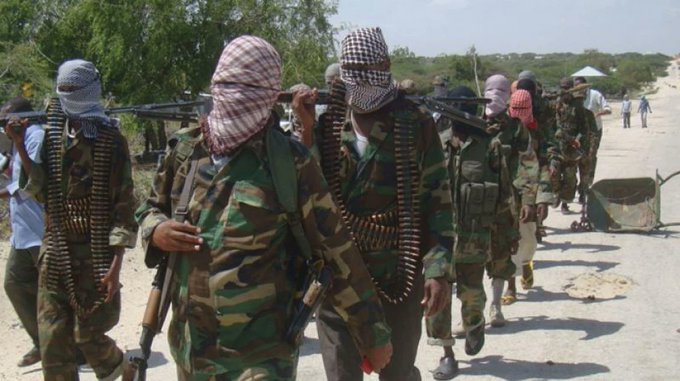A terror attack on Good Friday morning has shocked residents of Dhobley, a border town between Kenya and Somalia, resulting in the tragic deaths of six individuals and leaving one person injured. The victims, all identified as Meru businessmen, were mercilessly shot dead by Al-Shabaab militants who opened fire on them. The injured individual was identified as a Somali resident of the area who was caught in the crossfire.
Authorities swiftly linked the attack to the notorious Al-Shabaab terror group, which has long been active in the region and is known for its ruthless tactics. Confirming the incident, Liboi Deputy County Commissioner Ali Manduku stated that the attack occurred during the early hours of the morning and appeared to be driven by underlying business rivalries within the border town.
Manduku further elaborated that the militant group aimed to solidify its dominance within Dhobley through such brazen and violent acts. The deceased victims, all hawkers, are currently being prepared for transportation to Garissa town for further procedures and identification.
One perplexing aspect of the incident is how the six individuals managed to reach Dhobley, considering the official closure of the border between Kenya and Somalia since 2011. Despite this closure, residents from both nations persist in crossing the border for various activities, including business engagements.
Al-Shabaab attacks in Garrisa
The region of Garissa, already prone to attacks by militants crossing over from Somalia, has sadly witnessed its fair share of violence in recent times. Just last year, four officers lost their lives when their vehicle detonated an improvised explosive device (IED) on the Dadaab-Fafi road during a routine security patrol.
The surge in terror attacks, particularly in the Northeastern region of Kenya, has been a grim reality following the country’s military intervention in Somalia back in 2011. The Kenya Defence Forces (KDF) launched the incursion to counter terrorist threats but inadvertently triggered retaliatory attacks, intensifying the security challenges in the area.
Interior Cabinet Secretary Kithure Kindiki, speaking in the Senate last year, highlighted the devastating toll of terrorism in the country. He revealed that at least 500 lives have been lost to terror attacks since the infamous bombing of the American Embassy in Nairobi by Al-Qaeda terrorists in 1998.
The 1998 bombing, occurring on August 7, claimed 213 lives, including 201 Kenyans and 12 Americans. Subsequent attacks, such as the Westgate mall attack on September 21, 2013, which claimed 67 lives, and the Garissa University attack on April 2, 2015, resulting in the deaths of 148 people, mostly students, serve as stark reminders of the ongoing battle against terrorism and the need for heightened security measures in vulnerable regions.














